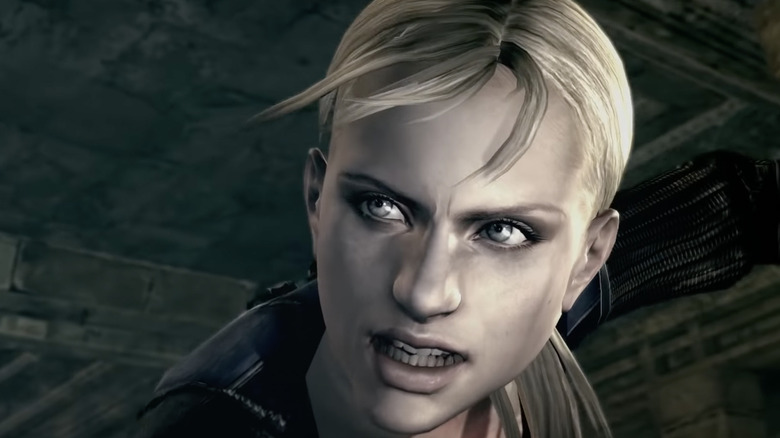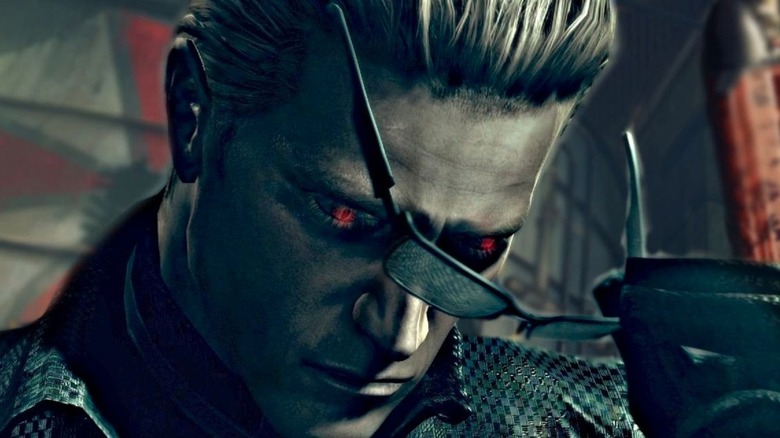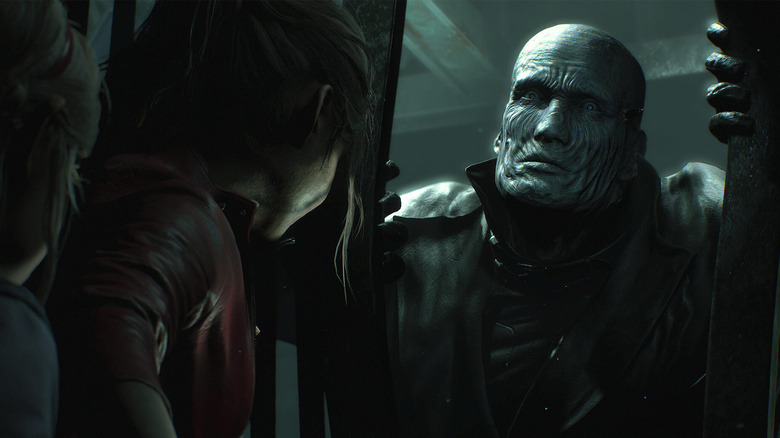The T-Virus Theory That Changes Everything About Resident Evil
In "Resident Evil" games, there's always a stalwart hero, or heroine, that comes to save the day. Whether it's fan-favorite rookie cop Leon S. Kennedy or the action-ready Jill Valentine, these characters find a way to make it through the horrors confronting them and live to fight the shady Umbrella corporation another day. One could say the protagonists of the "Resident Evil" franchise are the ultimate warriors against the T-Virus and its predecessors — but what if the T-Virus is actually the root of these characters' remarkable survival abilities?
A fan theory appearing on Reddit contends just that. User u/_LongLongMan posted their thoughts on the "Resident Evil" survivor conundrum, detailing how each protagonist has come into contact with the T-Virus and how they've developed since then. Sporting wild changes to their physiology, and even some supernatural abilities, each time a character returns to the series, they seem further from their original selves. There's a very good chance that what makes the "Resident Evil" protagonists so powerful is the very thing they're trying to eliminate. Here's everything fans need to know about the "Resident Evil" theory that changes everything about the franchise.
Are Resident Evil's Protagonists Infected?
Fans already know later "Resident Evil" titles see some of their characters tainted by the T-Virus — like when Leon is infected by the Las Plagas parasite in "Resident Evil 4" — but this theory purposes that the heroes were compromised long before that. Taking things all the way back to the Spencer Estate and the first game, u/_LongLongMan reminded fans that both Chris and Jill were attacked and grabbed by Plant 42, the botanic beast that reportedly sucked victims' blood through its tentacles. Even in the series' prequel, "Resident Evil 0," Rebecca Chambers is attacked by a Chimera. As for Leon and Claire, the duo are always pulling free from zombies' grasp, and Leon specifically traversed contaminated sewer water with open wounds, as some fans pointed out.
These are only the first instances of the heroes' run-ins with the Umbrella Corporation, but they could be what initially sparked the characters' resistance. Games much farther along in the "Resident Evil" timeline suggest that suffering a wound at the hands of any of these monsters is enough to cause infection, as evidenced by Ethan in "Resident Evil 7" and the frighteningly different "Village." However, the most evidence for these characters' infection doesn't come from the wounds they'd suffered early on, but the super-powered capabilities they showcase later.
Resident Evil Protagonists Have Super Powers
As the mysteriously-voiced Albert Wesker and other series antagonists have proven, those who can survive infection are often left with colossal power. Most of the time, this power comes at the price of losing one's sanity or physical form, but what if the series' protagonists were able to coexist with the infection? Surviving their wounds, they'd stand to inherit some of the benefits of the virus without receiving any of the drawbacks — at least, that's what the theory would contend.
By "Resident Evil 6," players see Chris and Jill portrayed as super soldiers, exhibiting unimaginable strength and resilience. Claire and Rebecca both seem to have increased intellect, while Leon showcases enhanced agility and reflexes. There's even that infamous time Chris punched a boulder aside. All protagonists have become masters of survival and combat against Umbrella's monsters, strengthening their own key traits along the way. Though Chris Redfield was toned down in "Resident Evil Vilage," it still appears that the protagonists enjoy some benefit from slowed aging. Assuming these characters are coexisting with some version of the T-Virus, what does that change about the series?
How Do Infected Protagonists Change Resident Evil?
If the heroes were, in fact, infected with the T-Virus early on, so much of the "Resident Evil" series would begin to make sense. Suddenly there's a solid explanation for each character's resilience and ability to come back after receiving what appear to be mortal wounds. It would also account for the ineffective use of the Las Plagas parasite on Leon in "Resident Evil 4" and the T-Phobos virus on Claire in "Resident Evil: Revelations 2." The same can be said for Jill's encounter with Nemesis during the events of "Resident Evil 3." Not to mention, infection and coexistence with the virus explain the characters' abilities that exponentially increase over the years.
While there's no hard evidence that confirms this theory, there is a lot of circumstantial evidence that helps support it, at the very least. Overall, the theory would prove to be an exciting explanation for the character's abilities and resilience. Otherwise, players are left to believe the series' protagonists have made it through countless adventures unscathed and that their superpowers are from...working out?




